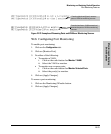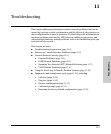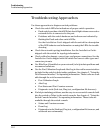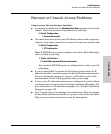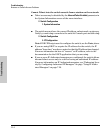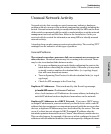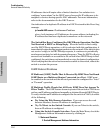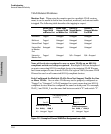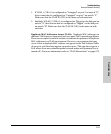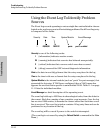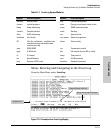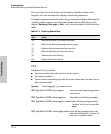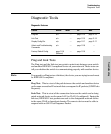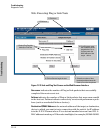
11-7
Troubleshooting
Unusual Network Activity
Troubleshooting
Problems Related to Spanning-Tree Protocol (STP)
Caution If you enable STP, it is recommended that you leave the remainder of the STP
parameter settings at their default values until you have had an opportunity
to evaluate STP performance in your network. Because incorrect STP settings
can adversely affect network performance, you should avoid making changes
without having a strong understanding of how STP operates. To learn the
details of STP operation, refer to the IEEE 802.1d standard.
Broadcast Storms Appearing in the Network. This can occur when
there are physical loops (redundant links) in the topology.Where this exists,
you should enable STP on all bridging devices in the topology in order for the
loop to be detected.
STP Blocks a Link in a VLAN Even Though There Are No Redundant
Links in that VLAN. In 802.1Q-compliant switches such as the SMC6624M,
STP blocks redundant physical links even if they are in separate VLANs. A
solution is to use only one, multiple-VLAN (tagged) link between the devices.
Also, if ports are available, you can improve the bandwidth in this situation
by using a port trunk. See “STP Operation with 802.1Q VLANs” on page 9-107.
Stacking-Related Problems
The Stack Commander Cannot Locate any Candidates. Stacking oper-
ates on the primary VLAN, which in the default configuration is the
DEFAULT_VLAN. However, if another VLAN has been configured as the
primary VLAN, and the Commander is not on the primary VLAN, then the
Commander will not detect Candidates on the primary VLAN.
Timep or Gateway Problems
The Switch Cannot Find the Timep Server or the Configured
Gateway . Timep and Gateway access are through the primary VLAN, which
in the default configuration is the DEFAULT_VLAN. If the primary VLAN has
been moved to another VLAN, it may be disabled or does not have ports
assigned to it.



